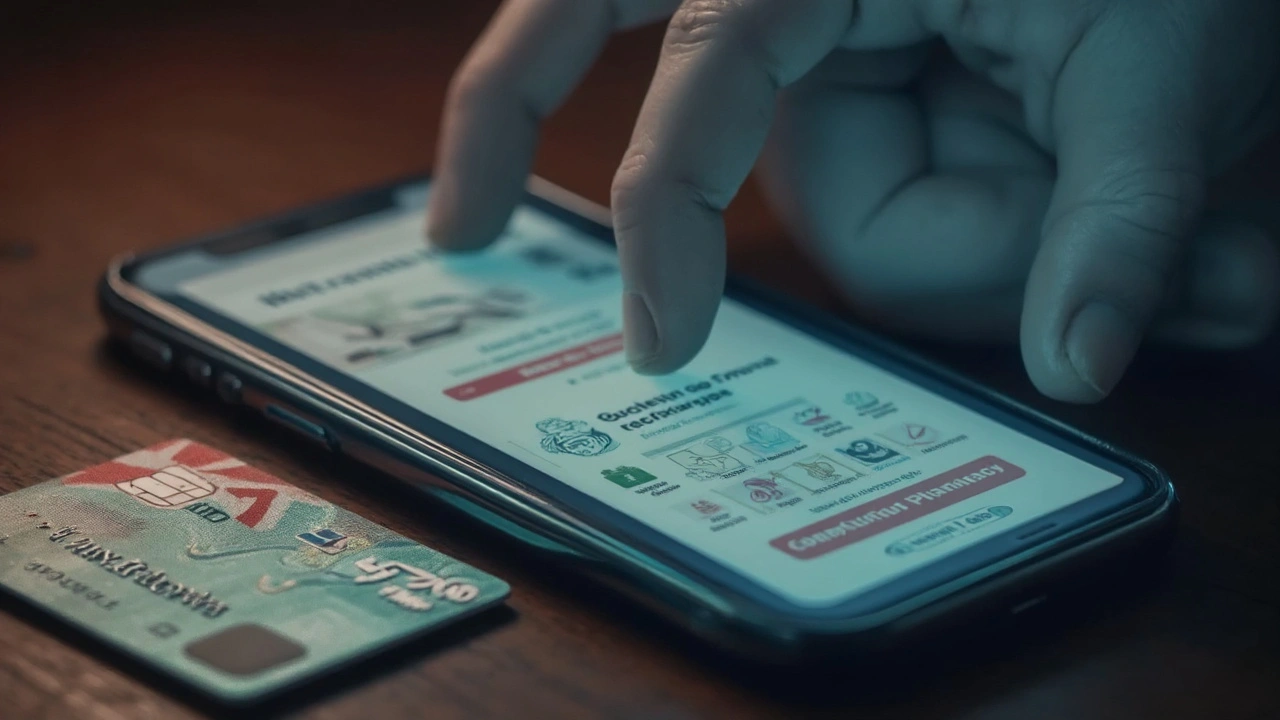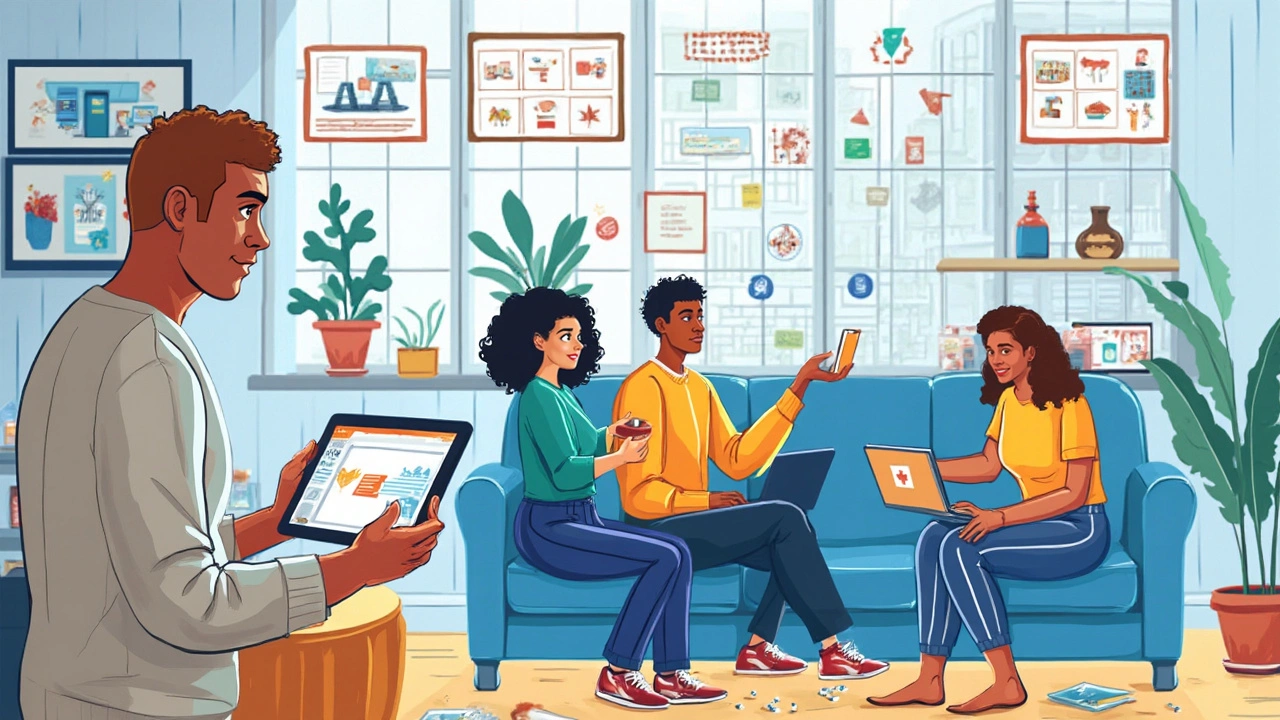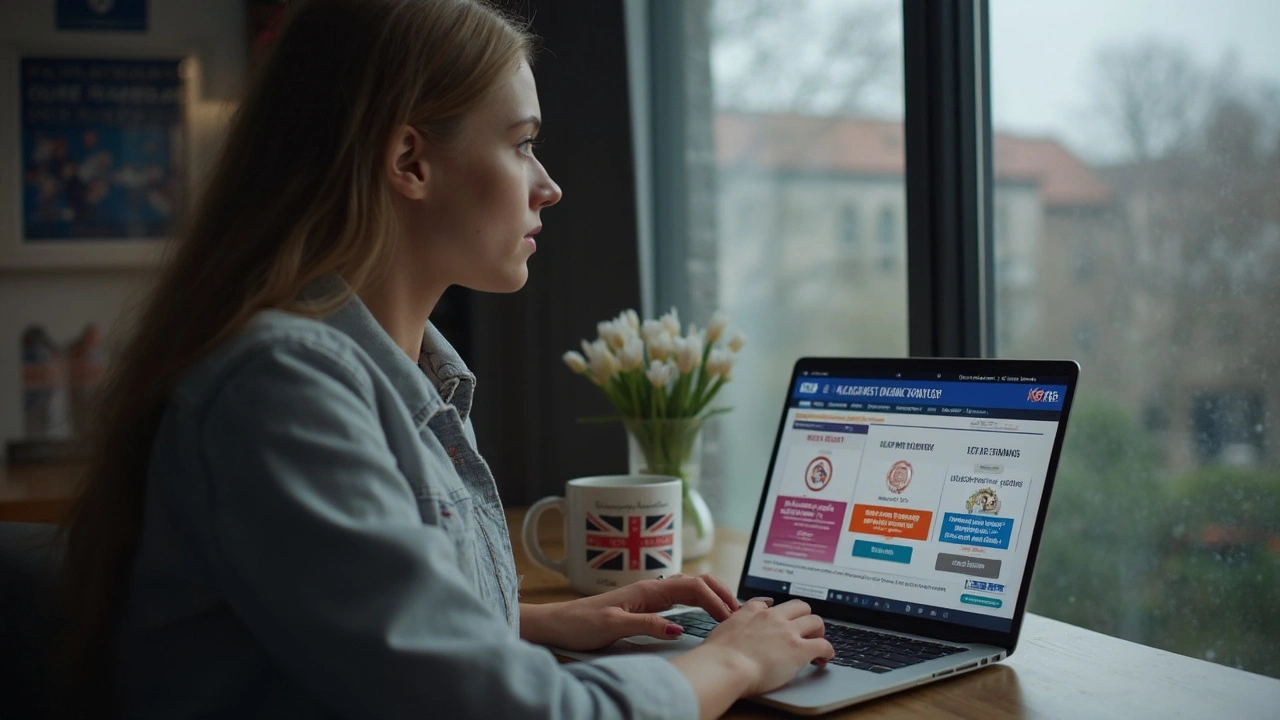Shopping for prescription meds online sounds like a breeze—until you stumble onto some shady pharmacy site that makes your stomach churn. Every year, uncomfortable stories pop up on Reddit and in the news, with people losing money or even getting sick from fake medicines. The FDA estimates that 97% of online pharmacies bend or break the rules; that’s not a typo. It’s no small thing to put your trust in some website you’ve never heard of, especially for something as important as Symbicort, the go-to rescue for asthma or COPD.
Why Pharmacy Accreditation Matters More Than You Think
If you saw a pharmacy site called "CheapScripts4U" with flashing banners and extra exclamation points, you’d probably pause a minute, right? But sometimes even fancy-looking websites can be hiding something. The top way to separate real from fake? Accreditation seals. Look for symbols like VIPPS (Verified Internet Pharmacy Practice Sites) in the United States or CIPA (Canadian International Pharmacy Association) if you’re eyeing a Canadian supplier. These seals aren’t just pretty stickers—pharmacies have to jump through hoops, prove they actually exist, and show they’re following real safety rules before they get one.
But here’s the thing: fake pharmacies copy these seals all the time. Just slapping a VIPPS badge on the homepage means nothing unless you check. Click the seal; if it links back to the issuing group’s website (like the NABP’s VIPPS database) and shows up in their official list, that’s a good sign. If it leads nowhere, or it looks like a low-res copy-paste, run.
Another quick trick is to look for a physical address and a legit pharmacy license number—then take two minutes to check that license with your state or national pharmacy board. No shortcuts here. If they don’t provide that info, or the address is some weird mailbox in the middle of nowhere, it’s best to walk away. Real pharmacies make this info easy to find because they know trust matters.
Want an extra layer of peace of mind? The FDA has a page called BeSafeRx with a nifty search tool. Pop the pharmacy name in, and if nothing shows up, you’re possibly dealing with a risky site. For Canadian online pharmacies, CIPA offers its own member database. Trust sites that point you to these verification directories, not away from them.
Spotting Safe Payment Methods and Avoiding Scams
You might think all legit online shops take Visa or Mastercard, but fake pharmacies prefer cash-like payments they can’t be traced with. If the pharmacy only wants wire transfers, cryptocurrency, or sketchy apps like Zelle or Venmo (for non-U.S. residents), hit the brakes. Solid sites use big-name, secure payment gateways that encrypt your info—think PayPal, credit cards, and major debit networks. They’ll have proper SSL security, too. That little padlock in the corner of your browser bar isn’t just for decoration.
Watch your statements after you buy, too. Real pharmacies bill you under their company name; fakes sometimes use random shell names you don’t recognize, or small one-off charges show up before the real bill, fishing for active cards. If that happens, or you notice unauthorized charges, tell your bank right away. Quick action can save you stress and serious money.
Here’s a practical pro tip: never send your social security number or banking login to order medicine online. Any site that asks for extra info that has nothing to do with your prescription? Probably a scam. The only thing any pharmacy truly needs is your prescription and basic shipping data. Everything else is bait.
Sometimes, you’ll see sites offering prices that look suspiciously low. If an inhaler of Symbicort is going for $15, that’s too good to be true. Stick to pharmacies with clear, upfront pricing that makes sense. The verify online pharmacy keyword isn’t just some buzz phrase; it’s your shield against creative scams fueled by desperation for cheap medicine.

The Real Deal on Privacy Practices and Keeping Your Health Data Safe
If you wouldn’t hand someone your health and credit card info on the street, don’t do it online either. Always read a pharmacy’s privacy policy before typing anything personal. Real pharmacies are obsessed with patient privacy—they’ll spell out exactly how your data is used, stored, and protected. That privacy link is usually right at the bottom of the page, never hidden. The less they say about how they’ll keep your info safe, the bigger your reason to bail.
Ask yourself: does this pharmacy only ask for what’s absolutely vital? Do they want more than your doctor, like driver’s license pics, or details about unrelated family members? That’s a red flag. Also, good pharmacies need proof of a real prescription. If they say "no prescription needed," that’s not only breaking the law—it’s dangerous, because they’re skipping all the safety checkpoints.
The right privacy practices mean your data stays out of marketers’ hands. If a site promises they "might share info with partners" (and doesn’t name them), expect marketing spam—or worse, outright fraud. Look for pharmacies that promise never to sell, rent, or trade your info. It’s a simple but powerful promise.
Also, check if their site talks about HIPAA compliance (in the U.S.) or similar privacy laws abroad. If there’s no mention of your right to privacy, you could be at risk of identity theft or insurance fraud. Your medicine is important, but so is everything else those forms reveal about you.
Red Flags: Warning Signs of a Bogus Pharmacy
Here’s a reality check: fake pharmacies keep evolving. Phony testimonials, made-up doctors' endorsements, even copied images of "happy customers"—I’ve seen them all. So, start with your gut. If something feels off, it usually is. Beyond that, there are some universal warning signs you can spot if you know where to look:
- No prescription required for prescription meds. Big nope.
- Tiny print at the bottom of the page with weird disclaimers or offshore legal language.
- No phone number, or one that never gets answered (try calling before buying anything expensive).
- Poor spelling, grammar, or generic claims (“Best medicine! Happy customer 100%!”).
- No accredited seals, or ones that don’t check out when you investigate.
- Super low prices that undercut average pharmacies by a huge amount.
- Check reviews—a totally blank slate or a wall of generic positivity is suspicious. Real pharmacies get both positive and negative feedback. Read the negative ones to see if problems pop up: missed deliveries, poor customer support, or people saying they got fake meds.
Here’s another tip: search the pharmacy name plus "scam," "fake," or "lawsuit" in Google. If others have been burned, you’ll find out quickly.

Best Practices and Safe Steps Before You Purchase Symbicort Online
Ready to get practical? Follow this list to keep your next pharmacy purchase safe and stress-free:
- Start with the official directories mentioned earlier (VIPPS for the U.S., CIPA for Canada).
- Double-check every accreditation seal. Don’t take anything at face value.
- Scan for a clear privacy policy. If you have to search too hard to find it, that’s a sign.
- Always use secure payment methods. If you’re forced into something unusual, step back.
- Avoid deals that sound too good to be true.
- Read real user reviews from several sites, not just the pharmacy’s own testimonials.
- Confirm they ask for a valid prescription. That’s not a hassle—it’s actually protection.
- Make sure customer support is reachable; call or email with questions before you buy.
- Protect your data: skip any site that asks for more than your prescription details and mailing address.
- When in doubt, ask your doctor or pharmacist. They sometimes know which online pharmacies are truly legit.
If you’re interested in a step-by-step guide on how to safely purchase Symbicort online, there’s a detailed breakdown available that walks you through everything—no guesswork required. Trust isn’t automatic these days, but it’s not impossible to find. With these checks in your pocket, you avoid the traps and get the medicine you actually need, the right way.


Thomas Burke
This article is super helpful, especially since buying meds online can be such a minefield.
One thing I’m curious about: how reliable are those accreditation seals really? Like, can they be faked easily or do they provide legit peace of mind?
Also, I wonder what the best practices are for verifying a site beyond just seeing seals. Do any of you check reviews or cross-reference with official pharmacy directories?
Would love any insider tips on ensuring the drug’s authenticity before diving in!
Gerard Parker
Great question. Accreditation seals like VIPPS or those from the National Association of Boards of Pharmacy (NABP) aren't just decorative — they represent a pretty rigorous vetting process.
That said, scammers are getting smarter. My advice: always cross-check the pharmacy's license status on government or official pharmacy board sites. Never trust a site just because it flashes seals. Look for consistent info across multiple credible sources.
Pro tip: if the price is way off market value, it's a red flag too.
Also, use payment methods that offer buyer protection, steer clear of wire transfers or crypto payments. Your wallet and health will thank you.
Debbie Frapp
Hey everyone! Just jumping in here to add to this great convo.
One thing I always do: check if the website requires a valid prescription. Legit pharmacies will never sell Symbicort or any prescription med without one.
Another tip is to call the pharmacy. If they avoid or refuse to answer questions about licensing or the medicine itself, that’s a huge warning sign.
Also, watch out for websites with poor grammar or spelling mistakes—it might sound shallow but these can be giveaways of fake sites.
Just my two cents for safe buying!
Joy Luca
Agree with the prescription policy 100%! Genuine online pharmacies require a valid prescription from a licensed healthcare provider, period.
Alongside that, I always advocate for checking the domain extension and website security certificates—https is a minimal baseline, but also look for verified business info in the 'About Us' section.
BTW, false advertising about the effects or uses of Symbicort can also clue you into sharky operations. If claims seem exaggerated or too good to be true, that’s your cue to bounce.
Financial transactions must be handled on secured gateways, not random payment links or direct bank details.
Steven Macy
Everything said so far paints a pretty comprehensive picture. It’s fascinating how the digital age blurs lines between accessibility and risk.
When considering acquiring symbicort online, apart from the technical keys to legitimacy, there's a personal responsibility element to this. Not only are we safeguarding our finances or data, but we’re upholding our own health ethics by ensuring we’re not inadvertently contributing to counterfeit drug circulation.
How do you all balance skepticism with trust? I think a mindful, informed approach keeps us safer than paranoia but still aware.
Pam Mickelson
Such an important discussion! I'd also add that people should look for customer support availability. Legit pharmacies provide real-time contact options: a phone number with a live person, email responses, or chat support.
If a website only offers a contact form with delayed responses, that's low-key suspicious.
Another thing is to verify the return or refund policies carefully. Scam pharmacies rarely make it easy to return or get a refund.
We often overlook these practical service elements but they reflect how professional and trustworthy an online pharmacy truly is.
Joe V
Really, folks, some of these so called 'online pharmacies' are just plain shady. You do yourself no favors by ignoring the obvious signs.
The way I've seen it, if their prices are ridiculously low, their website looks like it was designed in 1999, and they can't provide verifiable credentials, then it’s a no-go.
I'd add checking if the pharmacist is licensed to dispense medication in your jurisdiction. Sometimes that part is where the scam glosses over the fine print.
Remember: your health is not worth a 'good deal' on some sketchy website.
Lara A.
Guys, let’s be real. The whole system is rigged. These online pharmacies? Half of them are fronts to steal your info or worse, flood the market with knockoff meds.
You can’t trust the seals, the fancy websites, or the so-called 'reviews.' These are all planted by cartels working together with corrupt pharma companies.
Ever thought about who controls these online portals? Big Pharma makes billions and doesn’t care if you get fake Symbicort as long as you keep buying.
Punishing the system requires more than just caution—it needs a revolution, but hey, in the meantime, don't blindly click 'buy.'
Marcella Kennedy
I see where the skepticism comes from, but I think fostering education is the key rather than outright distrust.
Online access to medication can be a lifesaver for many who live in remote areas or have mobility issues, so we need to make this safer and more transparent.
Encouraging users to report any suspicious activity they encounter also helps build a safer community.
Let’s share resources and verified sites to make the process less daunting and more inclusive.
Ashishkumar Jain
Totally agree with the need for education and transparency, especially in countries like mine where access to healthcare is patchy.
It's also critical to consider language barriers; sometimes a legitimate pharmacy might look sketchy if they don’t have perfect English on their site, but that doesn't always mean they’re fraudulent.
So alongside the heavychecks mentioned - licenses, seals, payment security - a little cultural flexibility also helps avoid missing out on genuine sources.
What do you all think about community-driven validation efforts or forums focused on trusted vendors?
Gayatri Potdar
Omg, the paranoia around online pharmacies is warranted but sometimes people forget the simpler truths.
If you cannot read the terms and conditions or feel pressure to rush your purchase, RUN!
And beware of flashy promo codes or overly aggressive marketing—it’s often a trick to cloud your judgment and rush you into a bad buy.
Again, don’t ignore the importance of verifying proper prescriptions and asking for detailed info about the product’s manufacturing and expiry dates.
Better safe than snagged by a scam or worse, given dangerous fakes.